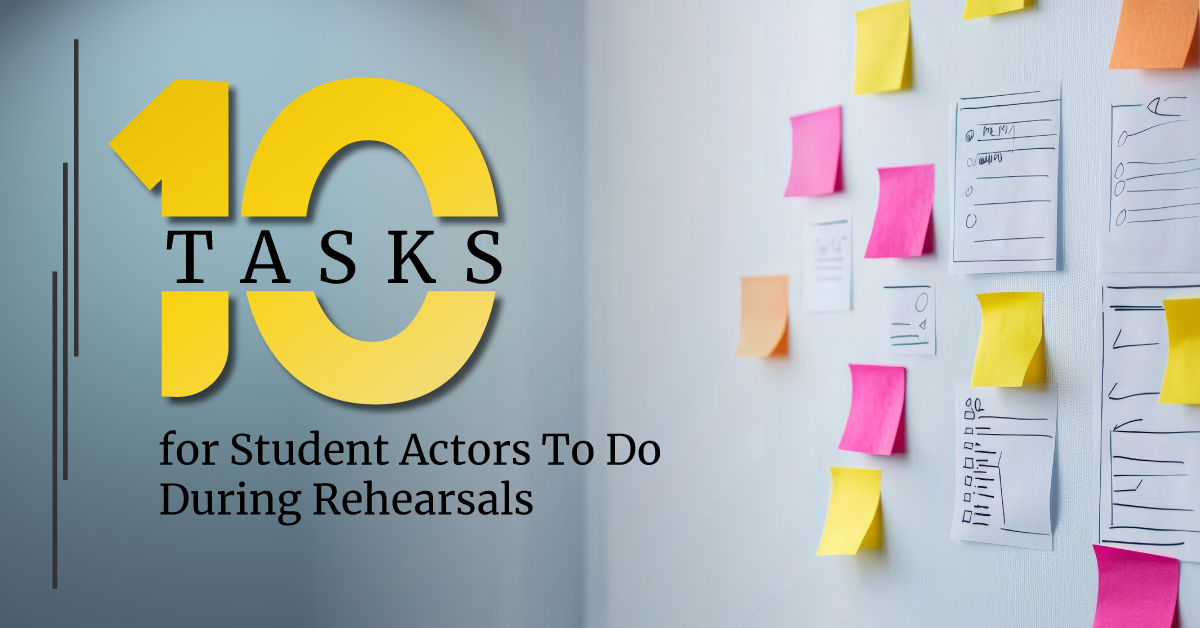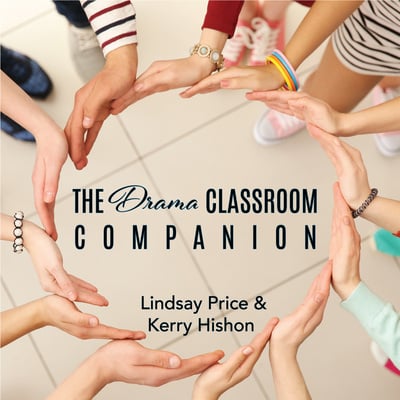10 Tasks for Student Actors To Do During Rehearsals
When you’re creating a rehearsal schedule for your upcoming production, whenever possible you should only call student actors to rehearse for the scenes they’re actually in. There’s no sense in asking students to attend rehearsals for scenes they aren’t in, as they will likely feel like their time is being wasted and they may distract other students.
However, there may be rehearsal days when some students are called for different parts of the rehearsal with breaks in between scenes being worked on (for example, Student X might be rehearsing for Scene 1 from 3–4 pm and Scene 3 from 5–6 pm, but they aren’t in Scene 2 which is being rehearsed from 4–5 pm), or perhaps your school has a policy in place that requires you to call all participating students for the full rehearsal time, whether they’re in the scenes being worked on or not. Whatever the case, you’ll need your students to keep themselves occupied during these times, so you can focus on the scenes you’re working on.
So here are 10 tasks that student actors can do during rehearsals to improve their own performances and make the best use of their time, when they aren’t rehearsing the scene at that moment. Print this page out for students to keep with their scripts (see below for a printable pdf) or post it in your rehearsal space to refer to. Feel free to adapt/eliminate any tasks as appropriate to your show.
NOTE: Please remain quiet and don’t disturb others, especially the students who are currently rehearsing. Stay in the rehearsal space or whatever the assigned location is; please don’t wander away or disappear, because even though you are not currently the focus of the rehearsal, you are still under the care and supervision of the teacher/director. If you’re needed for a part of the rehearsal later, be ready to go when it starts.
1. Review your lines and blocking for scenes that have already been blocked. A good rule of thumb is that if a scene has been blocked, you should be off book for that scene at your next rehearsal. We have lots of tips to help with line memorization as well as great advice from drama teachers to help with learning lines.
2. If you’re working on a musical, review your vocal lines, lyrics, and harmonies. Take recordings of your vocal lines during music rehearsals and listen to them over and over (with headphones, please, so you don’t disturb others). If you can, go to another room close by and practice your songs aloud. Review rehearsal videos for dance and stage combat choreography, again, with headphones. Get together with your scene partner and review everything in slow motion, paying attention to details such as pointed toes, what to do with your free hand, and avoiding looking at the floor.
3. Work ahead. Look at your rehearsal schedule and see what scenes are on the docket to be rehearsed soon, and read over those scenes so you’re prepared to come to rehearsal familiar with the scene and with ideas about how you might perform your role. Don’t memorize your lines ahead of time unless your director has specifically asked you to (you might memorize them in a particular way and your director might ask you to do something different) but do be familiar with the lines, entrances and exits, and overall purpose of the scene.
4. Do character work. The better you know your character, the better you’ll be able to portray them onstage. Try one of the following character analysis exercises:
- A Quick Tip for Character Analysis
- Character Analysis Exercise
- Character Analysis: Your Younger Self
5. Go through your script and make a list or highlight any costume changes, prop needs, entrances and exits, and any other notes for yourself to remember. Colour code them if it helps. Having your own personal running list will come in handy during tech week and show week.
6. Do some research and deepen your understanding of and connection to the show. Many Theatrefolk plays have free classroom study guides available for this purpose. Read articles or books, watch videos, or listen to podcasts about previous productions of the show. Learn more about the playwright and why they wrote it. If the show is set in a particular time period, learn five facts about life in that era. If the play is based on a book or movie, read or watch the original piece. For example, the musical Cats is based on T.S. Eliot’s book of poetry, Old Possum’s Book of Practical Cats. Note any differences or changes from the source material to the current script you’re working on.
7. Advertise your show on social media in a positive way. Share rehearsal photos or videos, do TikTok trends (such as “shake my hand in character” or similar), or create a countdown to opening night. Always be sure to include a link to purchase tickets in any posts you share!
8. Observe the current scene being directed. Listen to notes and advice the director gives to your fellow students. See if you can apply those notes to your own performance.
9. Offer to help others. Get together with other cast mates and quietly practice lines, lyrics, blocking, and choreography together. Read in lines for another character for scenes you aren’t in, or watch each other perform and give each other feedback. Keep feedback focused on technical aspects such as line and lyric accuracy, clean footwork and correct steps, and so on. Avoid giving directorial notes; leave that to the director.
10. When all else fails, complete your homework or read quietly. Use your time effectively so you can go home feeling accomplished.
Related Articles
The Drama Classroom Companion
by Lindsay Price & Kerry Hishon
The Drama Classroom Companion is filled with articles and exercises to build the skills needed for theatrical performance as well as real world skills like creative thinking, critical thinking, collaboration, and communication.
The Rehearsal Companion
by Kerry Hishon
You’ve chosen the play, paid the royalties, done the script analysis, held your auditions, and cast the show. Tomorrow is the first rehearsal. Are you ready? Really ready? The Rehearsal Companion can help!





